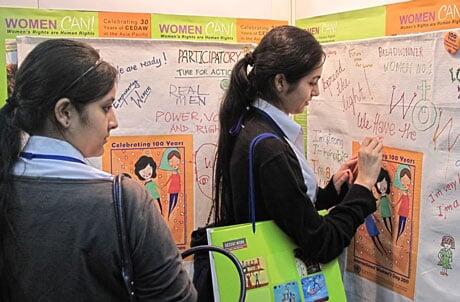BANGKOK – Promoting equal access to education, sexual and reproductive health services, and employment opportunities is crucial to ensuring gender equality and women’s empowerment, according to the presenters at the regional launch of the International Women’s Day on 8 March. They stressed that investing in women and girls has a positive impact on the well-being of families, communities and the economy.
Attended by UN officials, government representatives, women’s rights advocates and youth representatives, this year’s celebration marked the centenary of the first International Women’s Day. With the theme “Equal access to education, training and science and technology: Pathway to decent work for women”, the event highlighted the economic, political, and social achievements of women in the past 100 years across the globe and in the region.
While progress has been made in implementing laws advancing gender equality, women and girls still face barriers in exercising their rights. Many still endure unacceptable discrimination, violence and exploitation.
“In Asia, women and girls are often perceived as second class citizens. They are only expected to help out with household chores like cleaning and cooking, rather than voicing and advocating for rights,” said presenter Thaw Zin Aye of 7Sisters, a coalition representing young people from key populations affected by HIV across the Asia-Pacific region. “If the society thinks like that, what about women and girls living with or vulnerable to HIV. How will they be treated?”
When AIDS first emerged in the 1980s, most of those affected were men. But today, women account for nearly half of all people living with HIV worldwide. According to UNAIDS estimates, the number of HIV-positive women and girls has increased in every region over the past two years, with rates rising most rapidly in Asia, Eastern Europe and Latin America.
Women continue to be underrepresented in education and the labour market. By some estimates, women hold only 20 per cent of science and technology job globally.
“It’s hard to be a woman,” said Chayaporn, a network engineer at an information technology company in Bangkok. “Despite modernity, discrimination against women still exists in the workplace. To earn trust and respect from men, I need to work harder.”
In contrast, 14-year-old Disha, who plans to study biology in college, said she has been very lucky to choose her education, an option many girls her age do not have. “I encourage young people, particularly girls, to have stronger voice to raise issues that affect them. Our voices are being heard and things are gradually changing,” said Disha. “Despite all the issues plaguing us, I think that being a young women in the 21st century is exciting.”
– Philip Nalangan



